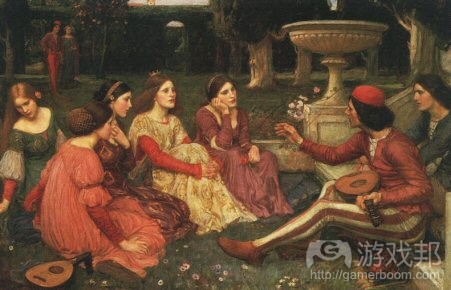阐述协调故事元素与游戏玩法的难处
作者:Rampant Coyote
游戏中不存在传统意义上的故事。
但是为何今天如此多“故事游戏”都包含过场动画?为何一名出色的DM甚至比完整的AAA级动画图像更重要?为何我们一直在制作精良的游戏中融入一些故事?问题的答案就在于故事和游戏的性质。
故事是关于一些有趣的角色出现在一些特殊的情境下;游戏则是指玩家出现在一个交互式的环境中。故事是关于弧线形结构,突出标志性内容并体现机智的对白;而游戏是关于机制,用户界面以及多元化的交互作用。故事是讲故事的人告诉听者的内容;而游戏则是关于玩家能够做些什么。故事是静态的;游戏是动态的。“但是故事会贯穿不同的时间进行呈现!”是的,我也非常喜欢故事,但是就以《指环王》来说吧,不论谁是读者,我们所看到的都是相同的故事。尽管故事相同,但是我们的反应却有可能不同。这便是我们需要进一步研究的内容。
故事是关于发生了什么事。游戏亦然。在故事中是由作者决定故事的行动,但是在游戏中却是由玩家决定游戏中的行动。而大多数游戏允许这两种方法的重叠。不过这么做却不容易,因为故事必须同时包含所有可能的玩家行动和动机。这点非常重要!
故事必须包含所有可能的玩家行动和动机!
玩家必须始终与故事相互协调。如果游戏开发者撰写了一篇与玩家相互矛盾的故事,那么游戏中必然会出现种种让人头疼的问题。如果玩家与故事出现矛盾,那必然会出现两种情况,要么故事胜出要么玩家胜出。而如果故事打败了玩家,那么玩家可能会永远都不想再玩游戏;这时的游戏便不再是游戏,更像是电影或者书籍。而如果玩家战胜了故事,那么这个故事也没有多大意义了;这时的故事也不再是故事,更像是一序列不连贯的行动组合。所以当玩家与故事不一致的情况下,要么玩家会偏离故事,要么就是故事偏离游戏。
很多优秀的游戏都通过简化游戏玩法或故事避开这个问题。如果玩家的行动能够限制在一些简单的行动中,如杀戮(第一人称射击游戏),那么故事便能够趋于复杂(即使是直线型的叙述过程)。如果玩家的行动内容更加多样(如沙盒模式),那么故事描述便会趋于基础化(并且包含分支内容)。这种协调故事与玩家间的分量配合便是早前游戏能够如此吸引人的重要原因。保持故事和机制的简单,从而让游戏很难与故事产生矛盾。但是这时你可能会抱怨道:“但是我们希望游戏更有意义!”的确,我们也希望这么做,但是在赋予游戏意义之前我们必须确保这首先是一款游戏。如果我们制作的是一款像书籍或电影的游戏,那么就不用谈它是否具有意义了。
“但是如果是在角色扮演游戏中,玩家能够自己讲故事,情况又是怎样!”在一款优秀的纸笔RPG中,DM与玩家相互陈述故事。DM创造了一个弧线形故事结构,插入了标志性内容,并想出有趣的对白。而玩家通过使用游戏机制,用户界面并发挥自己的创造性克服种种障碍并达到自己的目标。一名糟糕的DM可能会对玩家造成约束,让他们不能够阐述自己想象中的故事。而糟糕的玩家也会脱离自己在游戏中所扮演的角色,并破坏整个故事的发展。但是即使是最糟糕的真实纸笔RPG也比最优秀的电子游戏更具有交互性与故事性。甚至没有一款电子游戏能够达到最佳的现实纸笔RPG的水平。
因为DM具有创造性,既能够调整游戏世界的行动也能够适应于玩家的行动。DM可以围绕着玩家的行动阐述故事。为了获得优秀的故事与杰出的游戏玩法,我们必须发挥自己的创造性。我们必须学着如何教授电脑讲故事。一篇静态的故事总是会限制玩家的行动,而有限的机制也会对玩家的行动造成阻碍。在我们能够有序地讲出优秀的故事之前,游戏中可能只会存在一些简单的故事或者有限的玩家行动。
的确,真正意义上的角色扮演游戏故事发生在电子游戏中。然而我们也必须牢记,大多数玩家并不是真正优秀的讲故事者。所以我们有两个选择,或者让玩家按照自己的思维方式阐述故事,或者让玩家停止幻想,而按照故事设定好的脚本进行演绎。但是不管是哪种方法,游戏都不会按照我所熟悉的方式阐述故事。所以在交互式游戏中我们很少能够看到传统的静态故事。
游戏邦注:原文发表于2011年12月7日,所涉事件和数据均以当时为准。
(本文为游戏邦/gamerboom.com编译,拒绝任何不保留版权的转载,如需转载请联系:游戏邦)
Guest Post: Storytelling and Games
I’m off in Thailand for the next two weeks, which makes a great opportunity for guest posts. Today’s post is near and dear to my heart, about storytelling and games. Author Paul Spooner of http://www.peripheralarbor.com talks about why stories seem stupid in modern games, and where the real problem may lay…
Traditional storytelling has no place in games.
Tall order? Okay, here goes. Why are a lot of “story games” these days just Simon Says with cutscenes? Why is a good DM more engaging than fully animated AAA graphics? Why do we keep getting so many stupid stories in otherwise well executed games? The answer lies in the nature of storytelling and games.
Stories are all about interesting characters in engaging situations; Games are all about the player, in an interactive environment. Stories are all about arc, symbolism, and witty dialog; Games are all about mechanics, interface, and brilliant interactions. A story is about what the storyteller wants you to hear; A game is about what the player can do. Stories are static; Games are dynamic. “But stories speak to us across the ages!” you cry. Yes, I love stories as well, but the Lord of the Rings is the same whether I read it or you read it. Our reaction is different, but the story is the same. The same thing happens, and that is what we are concerned with.
The story is what happens. The game is also what happens. The writer decides action in the story, but the player decides action in the game. Most games allow these to overlap. This is difficult because the story must encompass all possible player actions and motivations. This is important!
The story must encompass all possible player actions and motivations!
The player and the story must always be in complete harmony. The problem occurs when the game developer writes a story in conflict with the player. If they conflict then either the story wins or the player wins. If the story wins the player is no longer playing. It’s not a game anymore, just a movie, or even a book. If the player wins, then the story makes no sense. It’s not a story anymore, just a stupid sequence of disconnected actions. When they disagree the player either derails the story, or the story derails the play.
Many good games get around this by simplifying gameplay or story. If player action is restricted (FPS style) to simple actions like killing, then the story can be complex (and even fairly linear). If player action is broad (Sandbox style) then the story must be elementary (and extremely bifurcated). This struggle between narrative and player agency is why many older games feel so much more immersive. The story and mechanics are so absolutely simple that the game has no chance to conflict with the story. “But we want games to be more meaningful!” you protest. Indeed, I do as well, but to impart meaning we must make games great at being games. Games will never be meaningful games if we try to make them books or movies.
“But what about RPGs! There the player can tell their own story!” Quite so, I’m glad you brought it up. In a good pen and paper RPG, the DM tells a story to the players, and the players tell a story to the DM. The DM engineers an arc, inserts symbolism, and comes up with witty dialog. The players use the game mechanics, interface (Voice activated usually; Advanced!), and creativity to overcome obstacles and achieve their goals. A bad DM will “railroad” the players to tell the story he wants. Bad players will act out of character and ruin the story. But even at its worst a real life pen and paper RPG is more interactive and narratively cohesive than all but the best computer games. At its best, no computer games come close.
This is because the DM is creative, and can adapt the actions of the world to the actions of the player. A DM can tell a story around the players actions, not in spite of them. In order to achieve excellent story and excellent gameplay, we must invent artificial creativity. We must teach the computer how to tell a good story. A static story will always restrict player actions. Limited mechanics will always frustrate players. Until we have procedural storytelling, games will always have simple stories or limited player agency, if not both.
The “role playing game” in the true sense is, indeed, the way forward for storytelling in computer games. However, we must always recall that most people are not good storytellers. Either we must allow the player to write their own (probably terrible) story, or we must give up the illusion of player agency and force the player act out a “good” story. We must choose between the two. Either way, games can not tell stories the way we have known them. Traditional static storytelling in an interactive game is simply out of place.(source:Rampant Games)
下一篇:游戏资产管理之设定资产命名规则








































 闽公网安备35020302001549号
闽公网安备35020302001549号